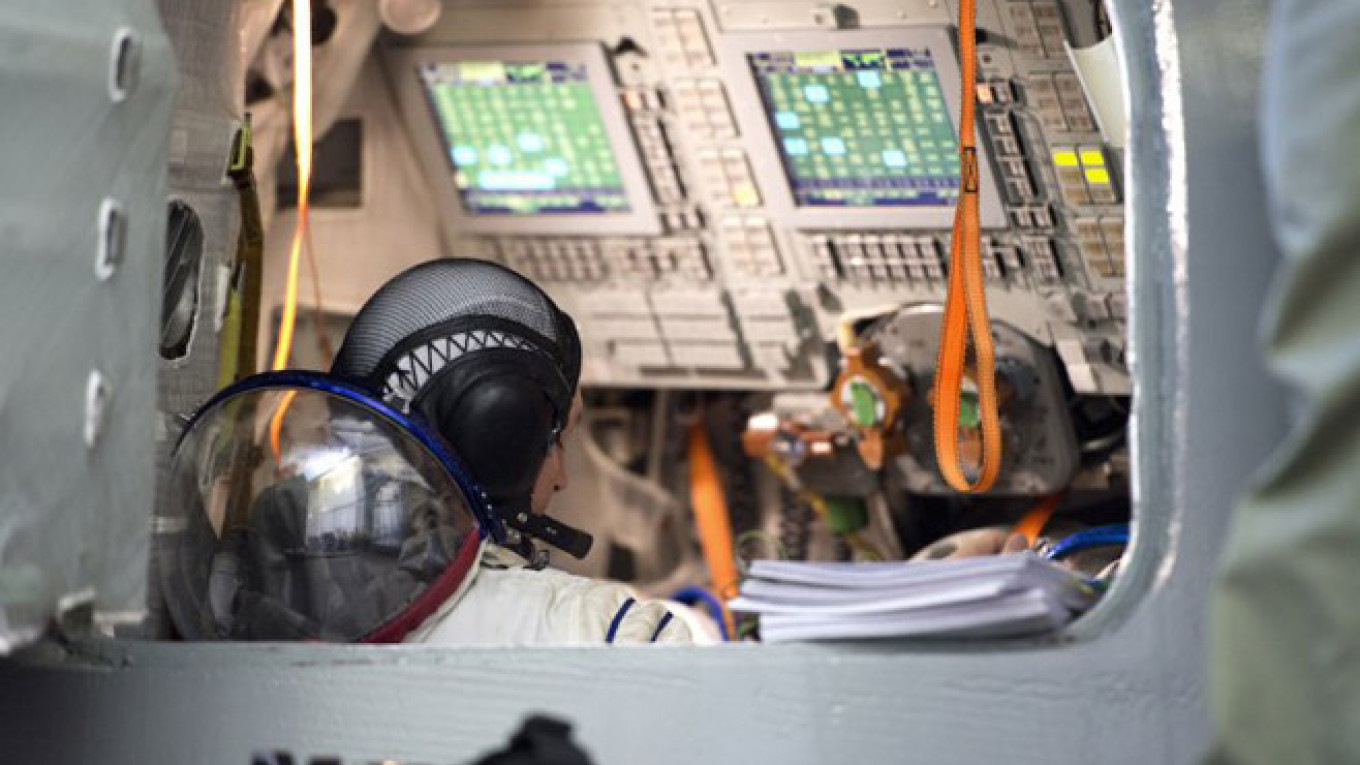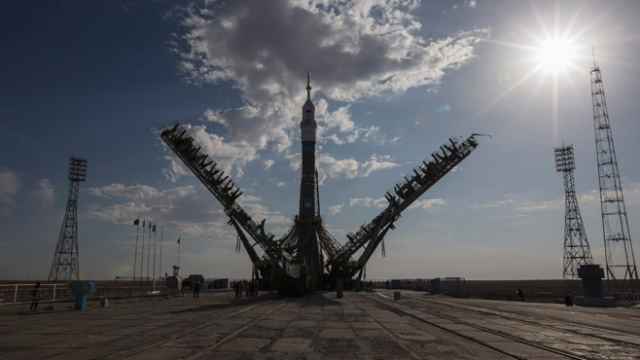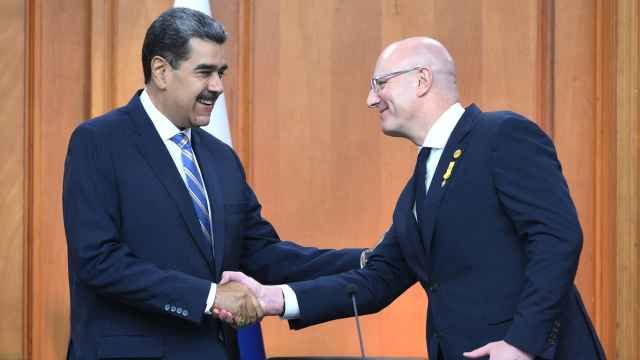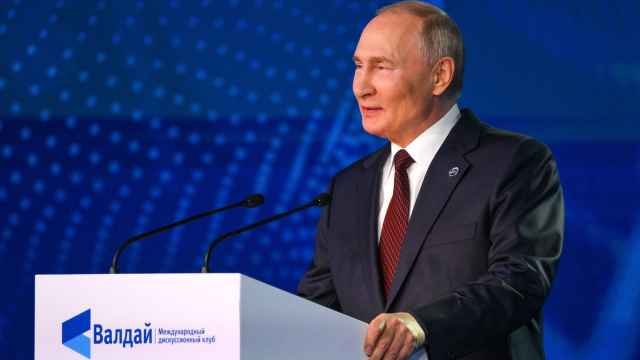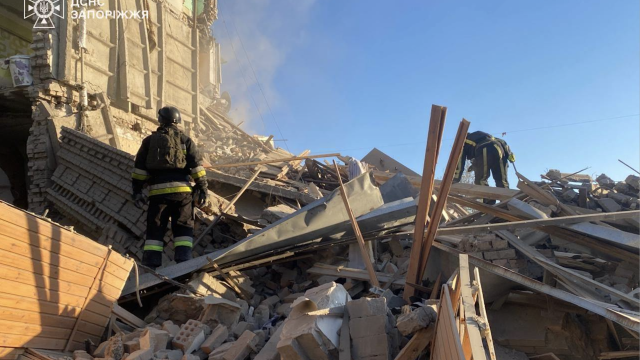Russia's first female cosmonaut to travel to the International Space Station, Yelena Serova, launched early Friday morning, making her the fourth Russian woman in history to go to space.
Serova is part of the latest international crew of astronauts and cosmonauts to fly to the International Space Station, where they will spend six months. She is joined by Russian cosmonaut Alexander Samokutyaev and U.S. astronaut Barry Wilmore.
A native of a country far more patriarchal than Western Europe or North America, Serova has been largely stoic regarding gender issues leading up to the flight, but during a pre-launch press conference at the Baikonur Cosmodrome in Kazakhstan on Wednesday, she responded to one reporter's question about taking care of her hair with a question of her own.
"Aren't you interested in my colleagues' hair?" she said at a news conference that was televised on Russian state television.
"I will be the first Russian woman to fly to ISS. I feel a huge responsibility toward the people who trained us and I want to assure them: We won't let you down!"
Serova's struggle with Russia's gender divide isn't new. Russia's space program, geriatric and conservative, has historically been under a glass ceiling. The numbers speak for themselves. In 1963, only two years after Yury Gagarin made his historic "first flight," Soviet citizen Valentina Tereshkova became the first woman in space. Since then, only two other Russian women have made the trip to space.
In contrast, NASA has flown more than 40 women of various nationalities into orbit aboard U.S. space shuttles, and several have commanded the International Space Station, such as NASA astronaut Suni Williams.
Williams recently completed a tour as NASA's head of training at the Gagarin Cosmonaut Training Center in Star City, just outside Moscow.
In November the European Space Agency will send Italian Samantha Cristoforetti, meaning that for several months, ISS will have two women aboard.
Tereshkova's flight was conceived by the Soviet leadership as a publicity stunt and was prompted in part by rumors that NASA was considering recruiting a woman into its fledgling astronaut corps.
When Tereshkova's Vostok 6 spacecraft experienced technical difficulties during the flight, Soviet space officials deflected criticism by blaming the female pilot, and plans to recruit additional women were dropped.
At a celebration for the 50th anniversary of Tereshkova's flight last year, former cosmonaut candidate Yelena Dobrokvashina was quoted by news agency RIA Novosti as saying the disparity between Russian and American women in space was, "of course, linked with the peculiarities of our mentality."
"Although they always said that everyone was equal — men and women — it's no secret that we live in a man's world," Dobrokvashina explained. "There was an opinion that men were scared that if women went into space … the aura of heroism would be lost."
Our lady-instructor for working in a space suit is far more attractive than Sandra Bullock from the film "Gravity" pic.twitter.com/Pek7cQaDSs
— Dmitry Rogozin (@DRogozin) September 25, 2014
In the early 1980s, Tereshkova's story repeated itself when word got out that NASA was planning to send Sally Ride, its first female astronaut, aboard the space shuttle Challenger in 1983. Therefore, Svetlana Savitskaya was sent aboard a Soyuz spacecraft in 1982 to become the first woman to conduct a spacewalk.
Only after the collapse of the Soviet Union did another Russian woman fly into space, Yelena Kondakova in 1994 and again on the space shuttle Atlantis in 1997 — making her the only Russian woman to fly on two different vehicles.
After another 20-year interlude, Yelena Serova was tapped to become Russia's first woman to visit the International Space Station — a massive $100 billion project that has been the focal point of both the American and Russian manned space programs for almost 14 years.
Serova, 38, is a space program insider. After working as an engineer for RSC Energia — the company that builds Russia's manned spacecraft and space stations — and doing a stint in Russia's Mission Control Center, Serova was selected to become a cosmonaut candidate in 2006.
In the days before her flight, Russian media, reacting to popular stereotypes about the role of women in Russian society, ran stories focusing on Serova's ability to communicate with her family while away from home, and the clothes that she would bring with her.
"Russian female cosmonaut promised to call her husband from orbit," one RIA headline read, as if Serova were the first human to leave their family behind to travel into space. Not to mention the fact that she is married to another cosmonaut, Mark Serov.
"My daughter is almost 17 years old," Serova soberly explained, adding that "ISS is now outfitted with completely modern communications systems, it has IP telephones and e-mail. I'll call home."
Another story, carried by Interfax on Thursday, reported that an entirely new line of cosmonaut clothing was designed for Serova.
"Yelena ordered a great deal of clothing," Alexander Yarov, head of Centaur Science, the company that has made clothing for cosmonauts for 40 years, was quoted as saying by Interfax.
"Her socks had to be custom-made," Yarov said," because she has little feet."
Contact the author at bizreporter@imedia.ru
A Message from The Moscow Times:
Dear readers,
We are facing unprecedented challenges. Russia's Prosecutor General's Office has designated The Moscow Times as an "undesirable" organization, criminalizing our work and putting our staff at risk of prosecution. This follows our earlier unjust labeling as a "foreign agent."
These actions are direct attempts to silence independent journalism in Russia. The authorities claim our work "discredits the decisions of the Russian leadership." We see things differently: we strive to provide accurate, unbiased reporting on Russia.
We, the journalists of The Moscow Times, refuse to be silenced. But to continue our work, we need your help.
Your support, no matter how small, makes a world of difference. If you can, please support us monthly starting from just $2. It's quick to set up, and every contribution makes a significant impact.
By supporting The Moscow Times, you're defending open, independent journalism in the face of repression. Thank you for standing with us.
Remind me later.


